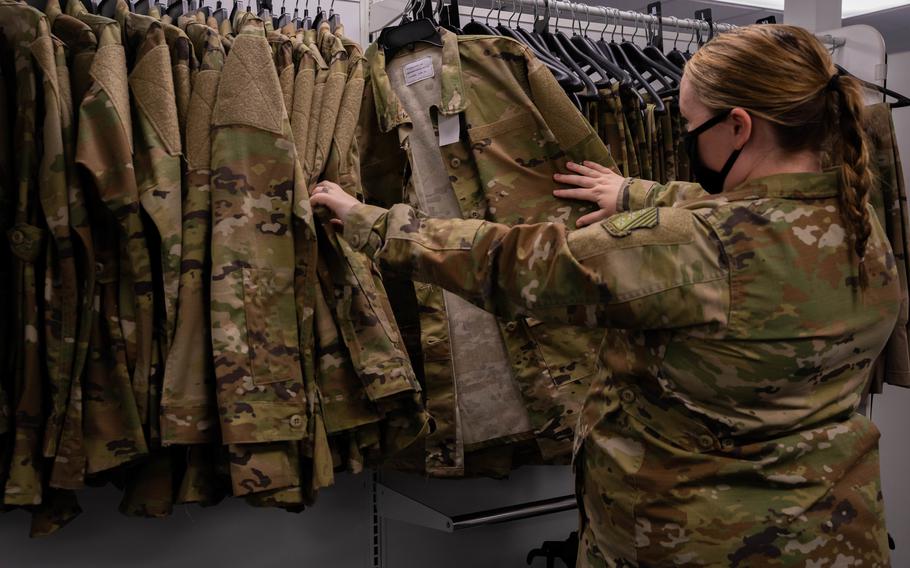
Senior Airman Quynn Santjer, Unit Deployment Manager for the 94th Fighter Squadron, looks through the new maternity options at Military Clothing Sales at Langley Air Force Base, Dec. 2, 2021. Pregnant airmen and guardians at 10 bases across the country and in Japan will soon be able to receive free maternity uniform items through the Maternity Uniform Pilot Program, or “Rent the Camo.” (Jaylen Molden/U.S. Air Force)
Pregnant airmen and guardians at 10 bases across the country and in Japan will soon be able to receive free maternity uniform items through the Maternity Uniform Pilot Program, or “Rent the Camo.”
The program is a joint effort between the Air Force and the Army, which will maintain a stock of operational camouflage pattern maternity uniforms for the program, according to an Air Force news release. The Air Force, Space Force and Army use the same OCP uniforms. Details on how and where to apply for the program are being finalized, the news release said.
Pregnant airmen or guardians at participating locations can work with their first sergeant to complete necessary documentation to obtain the uniforms. The service members temporarily will be issued three sets of maternity OCP tops and bottoms, which they can wear up to six months post-partum, the release said.
The bases participating in the pilot program are:
— Joint Base Elmendorf-Richardson, Alaska
— Joint Base Langley-Eustis, Va.
— Joint Base Lewis-McChord, Wash.
— Joint Base San Antonio, Texas
— Joint Base Pearl Harbor-Hickam, Hawaii
— Joint Base McGuire-Dix-Lakehurst, N.J.
— Pope Army Airfield, N.C.
— Shaw Air Force Base, S.C.
— Yokota Air Base, Japan
— Kadena Air Base, Japan
“By temporarily issuing free maternity uniforms, we can improve our airmen and guardians’ quality of life so they can focus on executing the mission,” John Fedrigo, Principal Deputy Assistant Secretary of the Air Force for Manpower and Reserve Affairs, said in the news release.
The program was created when Congress passed the Rent the Camo: Access to Maternity Wear Act in 2020. Under this bill, the Defense Logistics Agency will establish pilot programs within each military branch to issue maternity uniform items to pregnant service members, the news release said.
The bill also directs maternity uniforms not to be treated with the insect repellant Permethrin. While there is no known health risk associated with Permethrin, pregnant service members preferred that maternity uniforms not be treated with it, the release said. Reservists on Title 10 orders also are eligible for the program.
The program is expected to end Sept. 30, 2026, the release said.